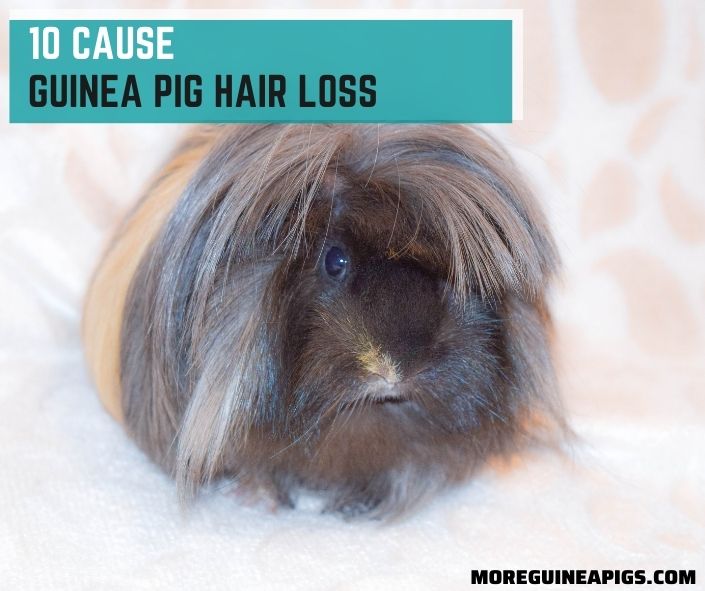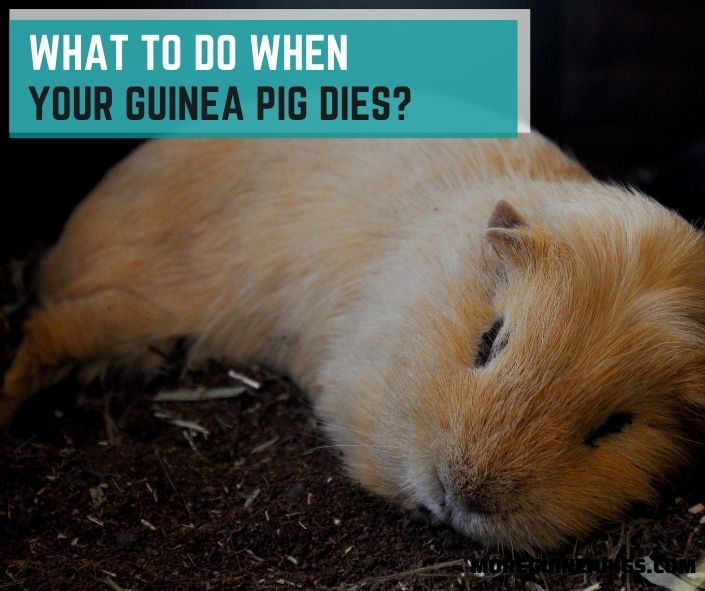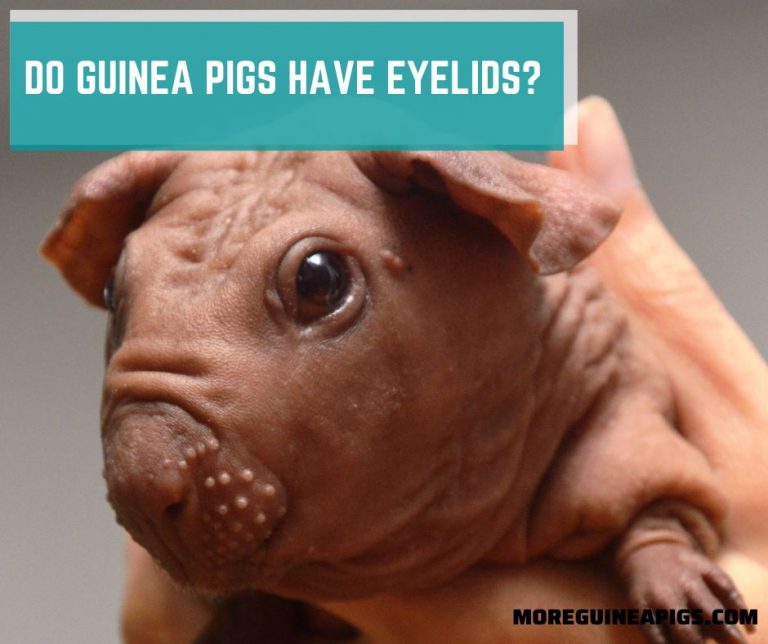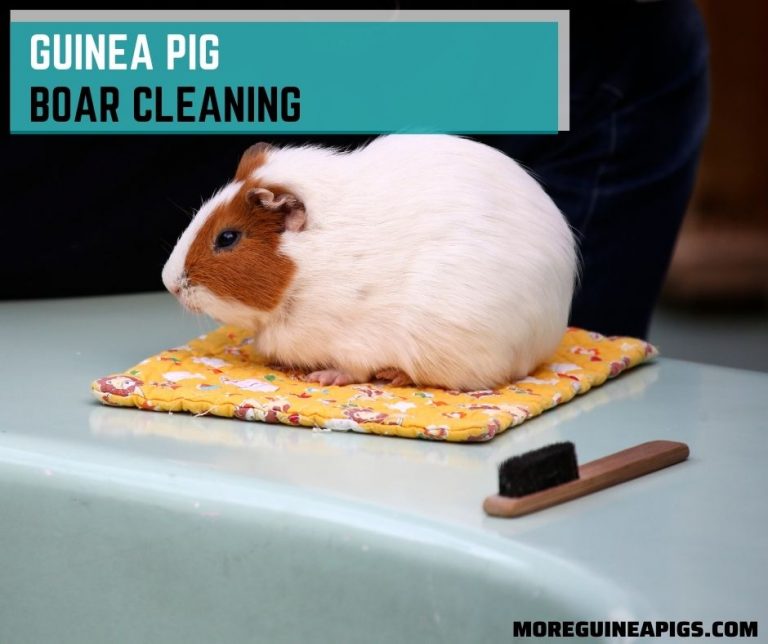10 Cause Guinea Pig Hair Loss – Tips to Treatment and Prevent
Did you know that hair loss is a top-most skin problem among guinea pigs? Yes, it’s an issue that many caretakers complain about, and it can be scary if you have no clue about it.
Many people will tell you that guinea pigs losing hair is a natural progression of aging. But it’s not always the case; hair loss has many underlying causes.
Some causes of hair loss in these rodents are completely normal, but others are a sign of health problems.
Luckily, hair loss in guinea pigs is treatable with medication or special attention from the owner. Read through the article to see the 12 causes of guinea pig hair loss, tips for prevention, and treatment.
10 Cause Guinea Pig Hair Loss
In most cases, a guinea pig losing hair shows severe itching, which can be painful and uncomfortable.
Consequently, the pig may lose the desire to eat, eventually affecting its health. If you notice your little friend losing hair, you could think of sickness as the root cause.
Yes, you may not be far from the truth, but there are other possible causes of guinea pig hair loss, including barbering.
Your piggy could also be losing hair as a natural process. Bear in mind that these rodents have minimal or absent hair density behind their ears, between nose and lips, around the lips, and on the external pinna.
Don’t be alarmed to see hairless areas; that’s how guinea pigs need to be; it is genetic. Other hair loss conditions require a prompt check-up and diagnosis, except for hairlessness in the mentioned areas.
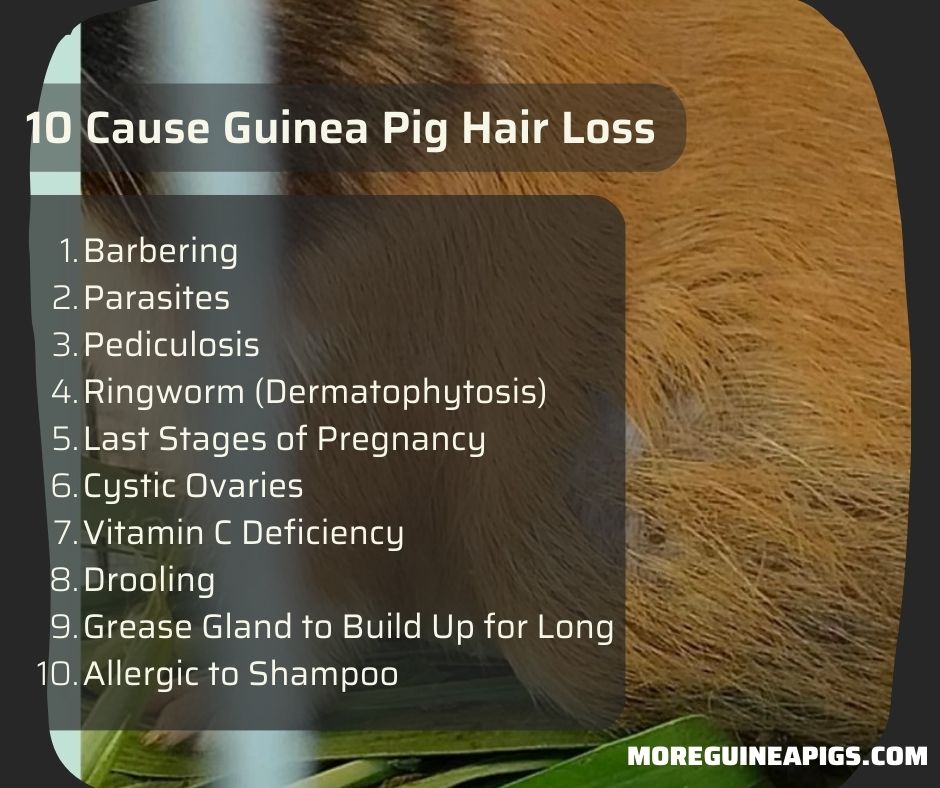
Barbering
Do you know what barbering is in guinea pigs? No need to scratch your head. Barbering is typical in piggies where they chew off each other’s hair and sometimes their own hair.
Barbering is common misconduct that transpires when guinea pigs try to establish their dominance.
These cavies are also likely to fight each other following an infection, boredom, or stress and nibble away each other’s fur leaving behind a bald patch.
Apart from a bald patch, the skin that suffered from barbering tends to be inflamed, perhaps pink or scabby. To address barbering, provide adequate hay and other objects of interest to keep your piggies busy.
You may also choose to provide an individual cage for the offender. If you turn your back on barbering, your guinea pigs may end up killing each other.
Self-barbering
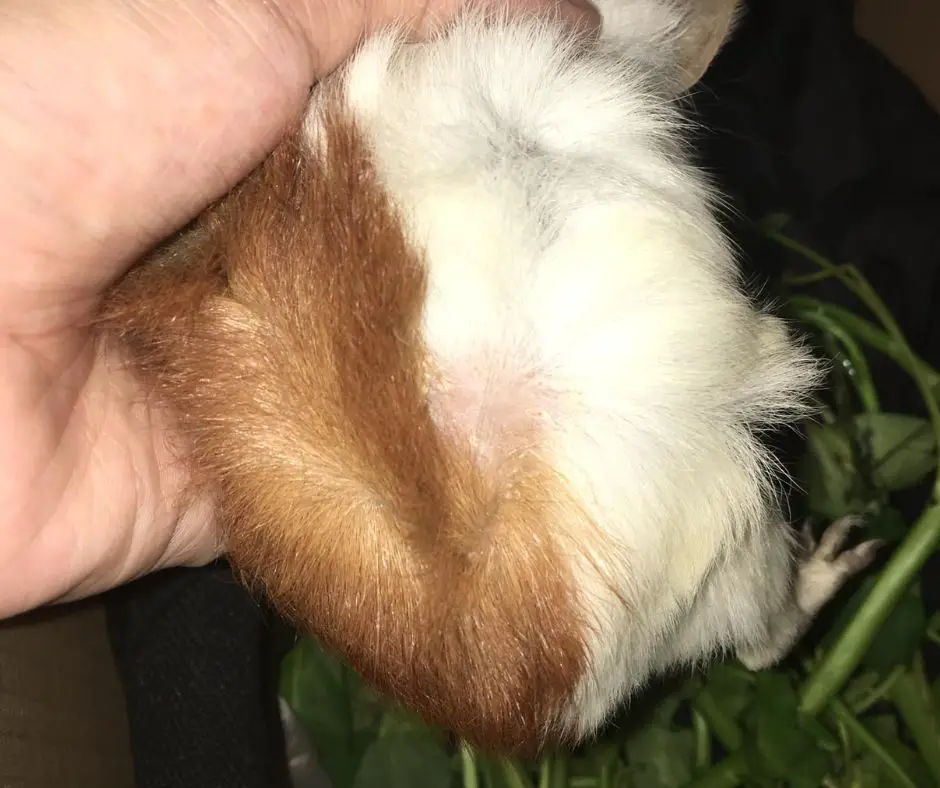
If the pig chews off its own hair, we call this behavior self-barbering. It’s not uncommon for guinea pigs to barber themselves.
If your piggy experiences intense itching, it may scratch itself on objects or bite the affected area and tear down the fur.
Boredom and stress also encourage self-barbering. Other things that trigger this misconduct include pain and discomfort (e.g., bloat and gas).
A tumor is sometimes evident internally in the barbered areas. To avoid self-barbering, you can provide playing toys and keep supplying hay to your piggy.
Moreover, form a habit of monitoring your furry friend’s fur/hair to ensure that its skin is healthy and free from injuries. Provide a spacious hutch to help curb stress.
Also, changing your piggy’s diet is an ideal way to make it stop chewing its hair. Applying some lemon or bitter juice on these piggies’ fur to make them unpleasant for nibbling is an effective way to stop barbering.
War wounds and Abrasion (and other miscellaneous mechanical hair removals)
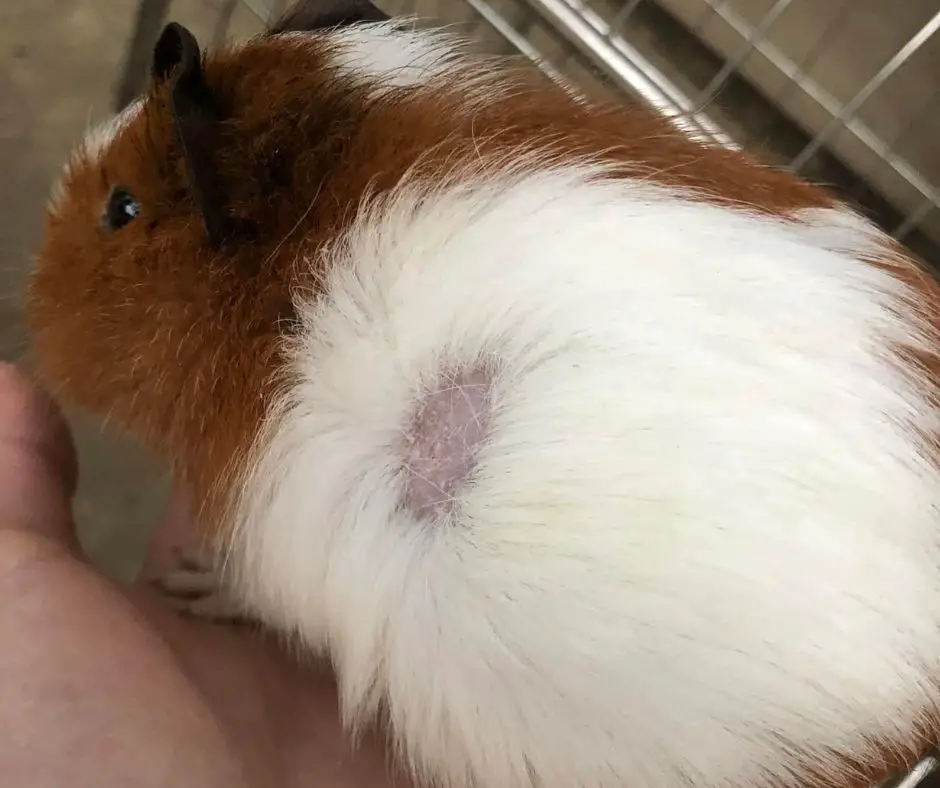
Along with barbering and self-barbering, war wounds and abrasions cause mechanical hair loss in guinea pigs.
Some piggies are fighters naturally, and they root out hair from unfortunate piggies during a fight. The behavior may go unnoticed until severe open wounds and hair loss are visible to the victim.
An unprepared vet dealing with an uncooperative piggy may inflict a painful patch of hair loss. Likewise, your young child can pinch off some hair from your guinea pig. Your little friend may also rub off its hair on objects when running or playing.
It’s also possible for the pups to lose hair from their noses during the nursing process. Do you see your guinea pig rubbing off its face with its front legs? I guess not once but many times.
Their front legs usually have bald spots due to this grooming behavior and where the hair fails to regrow.
Parasites
If your guinea pig has severe parasite infestation, it makes them itch so much and scratch off their hair/fur. Guinea pigs are susceptible to a myriad of parasites, including mites and fleas, with mites being the most common,
Your furry pet can get parasites by coming into contact with an infested piggy or from beddings harboring them. The two species of mites that infest guinea pigs are Trixacarus caviae and Chirodiscoides caviae.
Also read: Guinea Pig Mites: Signs, Causes, and Treatment
Trixacarus caviae
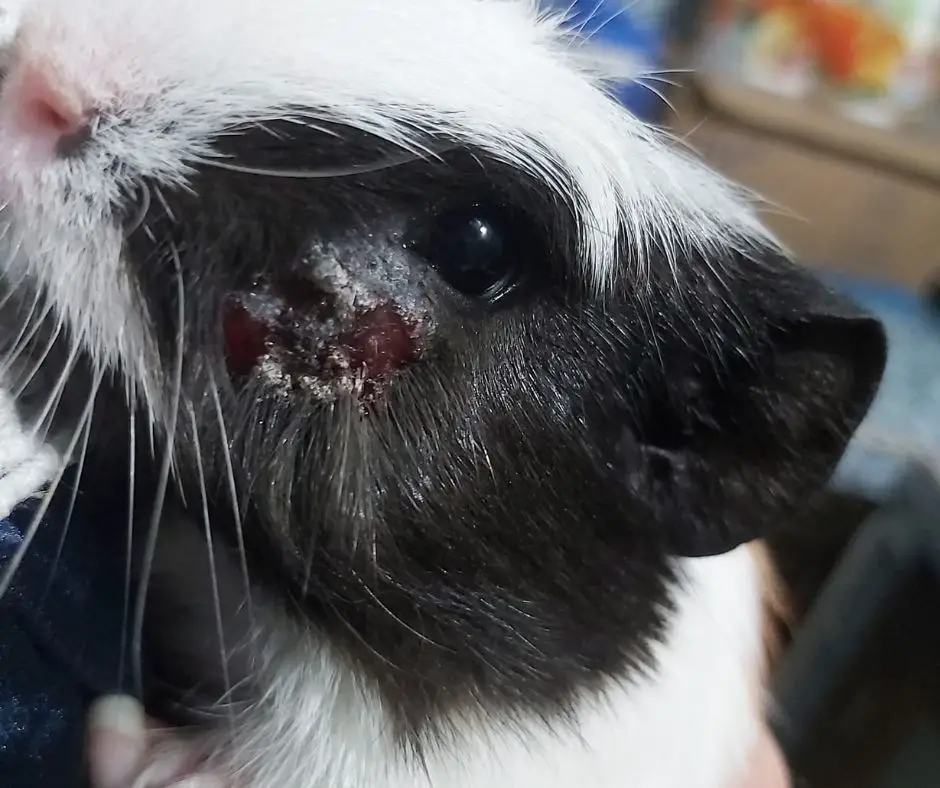
Sarcoptic mange mites (Trixacarus caviae) are a big concern if they infest your guinea pig. They cause extreme itchiness that leads to frequent and intense scratching, and eventually, the pig scratches off its hair.
Sarcoptic mites tend to burrow under a piggy’s skin, and that’s why the victim piggies bite, scratch and itch. Sarcoptic mange is incredibly contagious and zoonotic, which can affect even humans.
It’s imperative to give your little friend a daily health check since you will likely spot any problem quickly.
Remember that these species of mites bring about itchiness that your pig may go into seizures and lose its life. A guinea pig may manifest the following signs if it has sarcoptic mange mite;
- Hair loss
- The affected part of the skin becomes thick and occasionally yellowish or crusty.
- Depression, lethargy, anorexia, and weight loss.
The ideal treatment for guinea pigs with sarcoptic mange is ivermectin. Be sure to receive instructions from your vet about the treatment process.
Chirodiscoides caviae
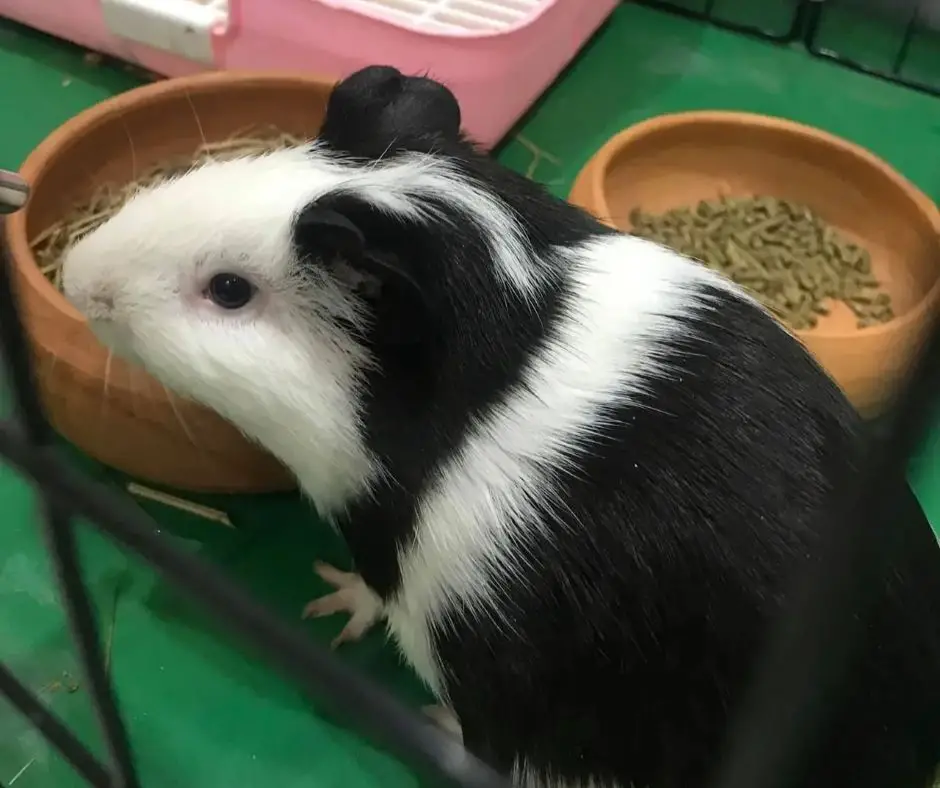
Unlike sarcoptic mange mites, static mites (Chirodiscoides caviae) inhabit a guinea pig’s hair and get nourishment from the skin debris.
Static mites are noticeable on a guinea pig’s fur as specks of dirt. These mites are typically harmless but may cause minor itching and scurfy skin.
The mites mostly come from hay, giving them their alternative name ‘hay mites.’ It’s possible to prevent static mites by identifying their root cause and looking for a means to eliminate it.
For instance, avoid buying cheap hay or getting hay from the farm. Likewise, try different hay brands and get them from different shops.
In the process, you will know which brand is quality and where to find it. You will also need to bathe your piggy frequently to remove the mites.
Pediculosis
Pediculosis, also called lice infestation, could also be the reason for hair loss in guinea pigs. The condition of pediculosis intensifies when a guinea pig is subjected to stress. It causes uneasiness and irritation to a pig.
Lice are blood-sucking parasites and expose guinea pigs to subsequent anemia. These parasites primarily infest areas around the neck and ears in guinea pigs.
Contaminated beddings are the primary source of lice parasites. You can see lice and lice eggs on the skin and hair of an infested piggy. In addition, guinea pigs with pediculosis exhibit signs such as;
- Extreme itching
- Hair loss
- Weakness and anemia
- Visible inflammations around the neck and ears
- Restlessness.
You can address the problem of lice infestation by using clean and quality beddings and treatment involves applying parasiticides or using sprays designed to kill lice.
Ringworm (Dermatophytosis)
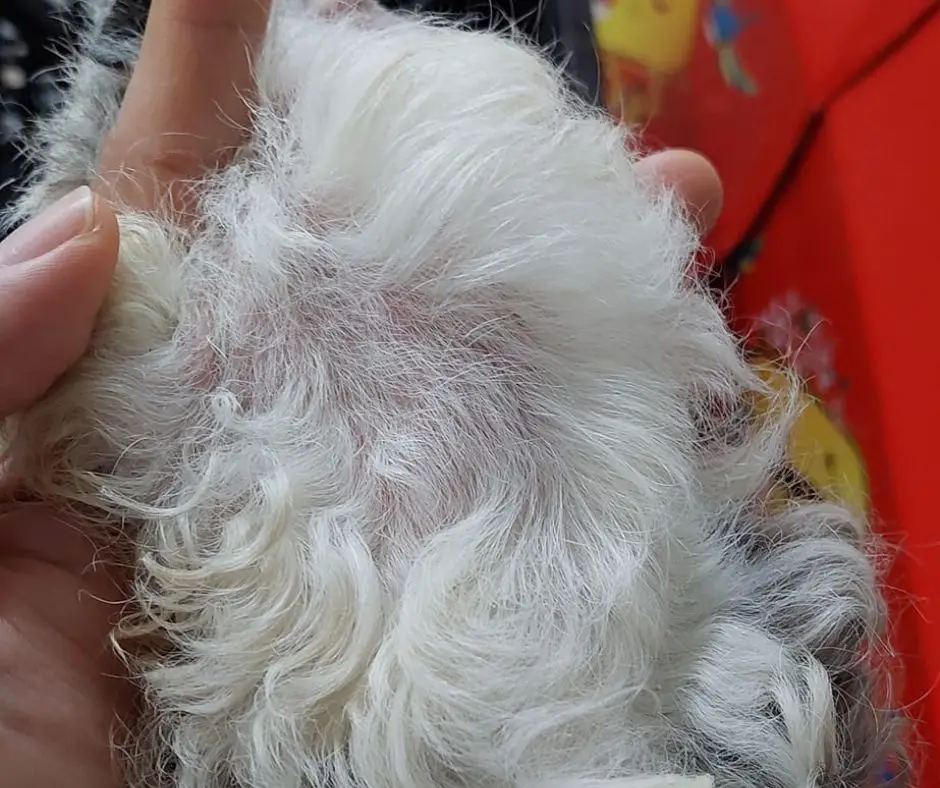
Ringworm is a common fungal infection that affects guinea pigs. This infection is highly transmissible to guinea pigs when they contact infected piggies, touching contaminated beddings and the cage’s objects.
Another essential thing to note is that people can get ringworm by touching infected guinea pigs. Always handle your sick piggy with care. The primary symptoms of ringworm in guinea are bald patches.
The bald patches will first appear on the ears, nose, and around the eyes. However, the patches are likely to spread to other body parts when treatment is ignored.
Make an effort to see your vet if you notice intense scratching with your pig. The effective treatment for bald patches showing crusty and flaky surfaces is topical ointments or medical washes. Antifungals are the treatment for ringworm.
You can prevent ringworm by keeping your guinea pig’s enclosure clean and sanitizing it frequently.
Also read: Guinea Pig Scabs: Signs, Cause and How To Treat
Last Stages of Pregnancy
A pregnant sow often loses hair over the back and flanks when she is in her last stages of pregnancy. It’s a regular occurrence, and caretakers should not worry about it.
The hair should regrow after the pups are born. However, if the hair does not resolve or if she is itchy, or if the skin looks sore even after pregnancy, be sure to get help from your veterinarian.
Perhaps your pig is losing hair due to a parasite infection, nutrient deficiency, etc. Your vet will examine and know the reason behind the problem.
Also read: Care of a Pregnant Guinea Pig
Cystic Ovaries
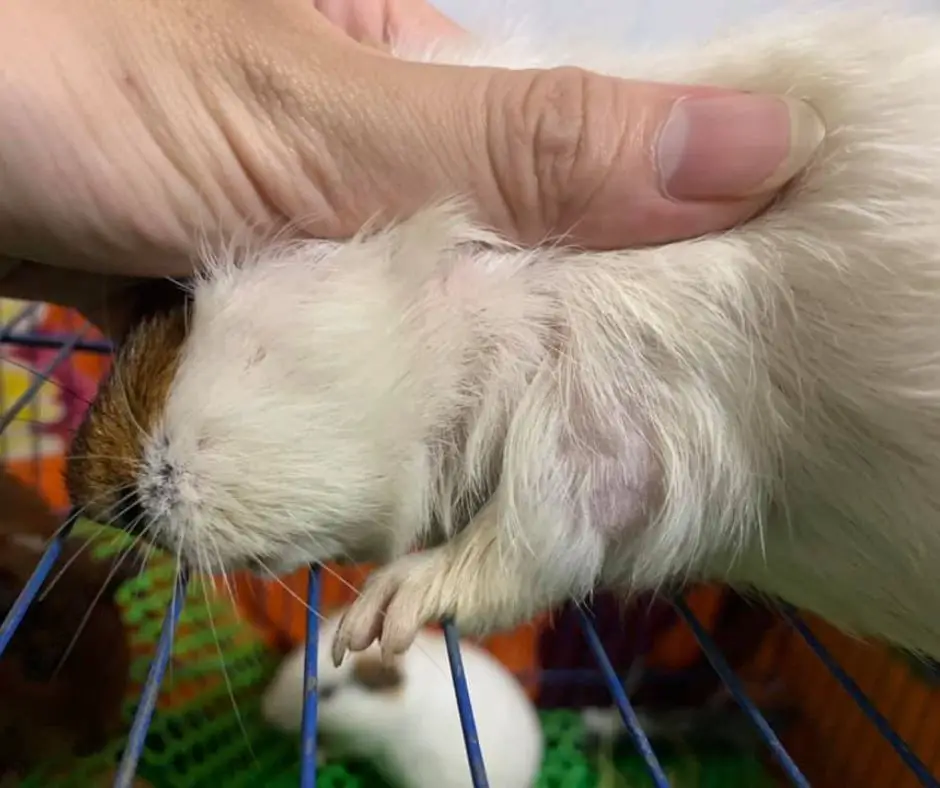
Ovarian cysts can affect one or both ovaries. They are sacs of fluid that form within or on the ovary’s surface—the condition results from hormonal imbalance.
Females have smaller amounts of androgens, such as testosterone; however, if the level increases, it makes the guinea pig’s hair thin.
Most piggies with this disorder tend to grow thick hair around their faces and body, with some hair loss and thinning. Unfortunately, hair loss associated with this condition in most cases does not regrow.
But sometimes, the hair can grow back with treatment. Several treatments and prevention measures can help treat hair loss due to cystic ovaries. You can give zinc supplements to your pet; it can help prevent hair loss.
Biotin will also stimulate hair growth. Removal of ovarian cysts can cure the piggy’s condition. This is the only advised and effective treatment. Further, weight loss is another approach to help lower androgen and prevent hair loss and thinning.
Vitamin C Deficiency
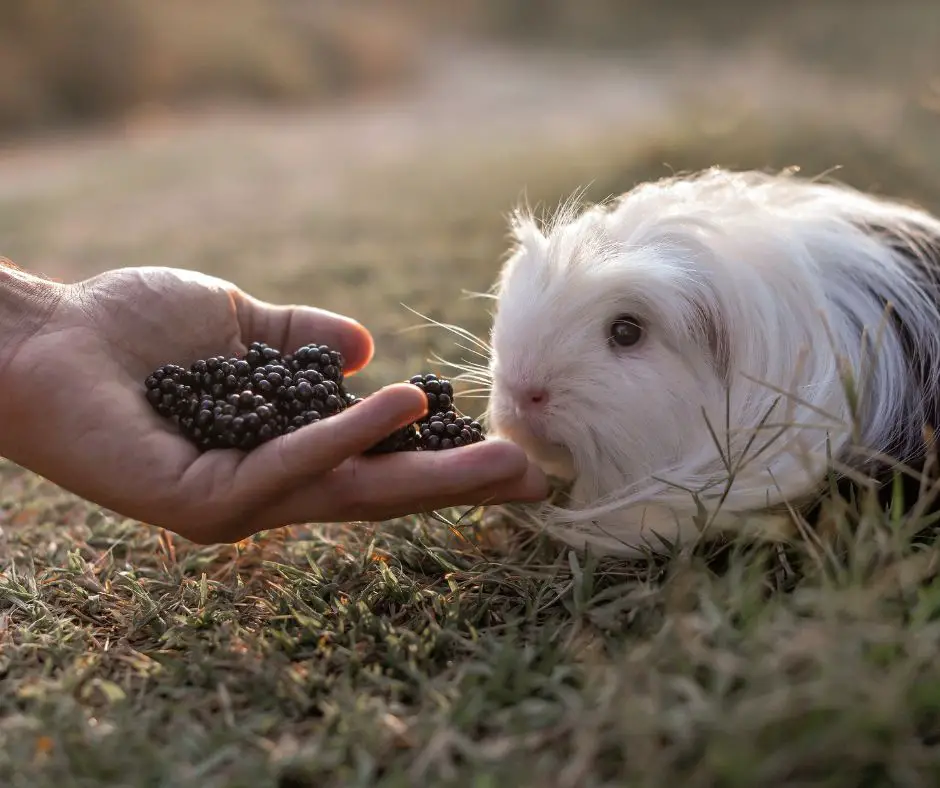
Vitamin C deficiency or scurvy is pretty common among guinea pigs. Because guinea pigs cannot make their own vitamin C, they need to get adequate nutrition from the diet.
Vitamin C plays a significant role in the production of collagen that is responsible for holding cells and tissues together. So, scurvy results from a lack of maintenance of the collagen matrix.
The symptoms of vitamin C deficiency in guinea pigs are evident, including alopecia, diarrhea, unwillingness to move, dental issues, weight loss, painful joints, and lethargy.
The primary source of vitamin C is fresh fruits and vegetables. Ideally, guinea pigs require at least 15% of fresh fruits and veggies in their diet. Also, vitamin C supplements play a big role in supplying this nutrient.
OASIS #80254 Vita Drops-Pure C for Guinea Pig, 2-Ounce
Drooling
You are likely to spot a guinea pig drooling if you notice it is wet under the chin, although the reasons for a wet chin could be many.
Drooling in guinea pigs can result from many things, including respiratory problems, misaligned teeth, overgrown teeth, overheating, and food poisoning. However, the dental problem is the leading root cause.
In the case of overgrown back teeth, the teeth trap the tongue, making the pig drool. Guinea pigs need to wear down their ever-growing teeth through frequent chewing on hard food.
Your vet should examine all the teeth and check for any misalignment. Drooling that persists for some time causes hair loss under the chin. Don’t forget that drooling mostly transpires from a health issue.
Therefore, if you aren’t sure about your little friend’s health, it’s advisable to see your vet for the pet’s check-up. The vet will be able to know the reason why your pig is drooling and address it.
Grease Gland to Build Up for Long
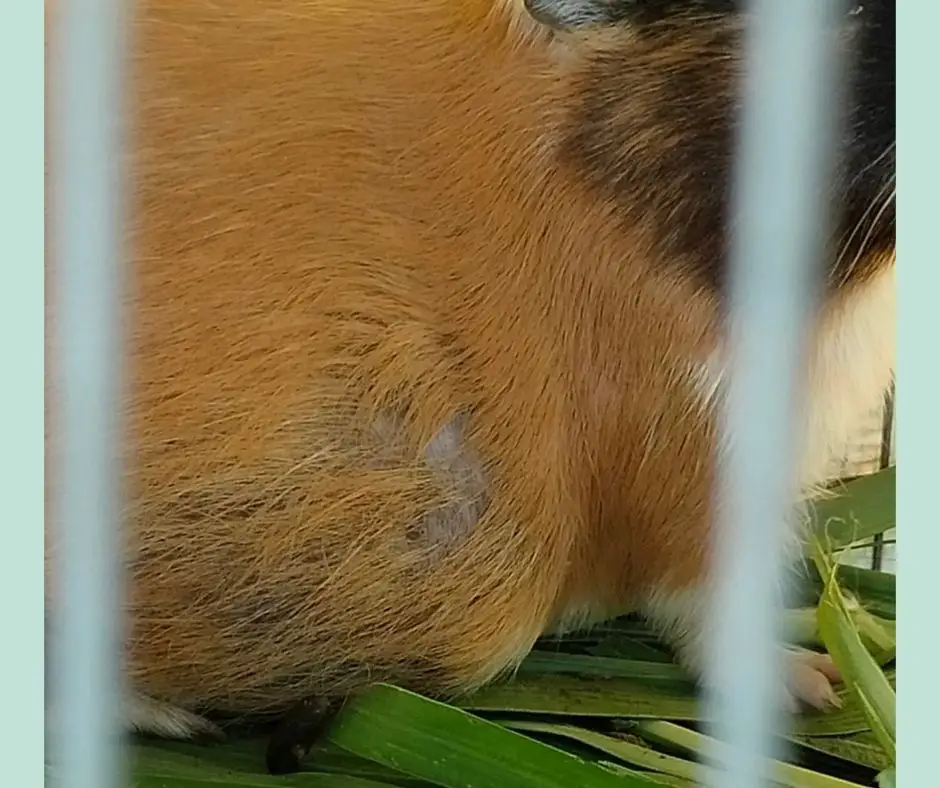
Grease glands come about during puberty, and it’s a common condition in male guinea pigs. They secrete excess grease glands that make the skin smelly.
A guinea pig grease gland is located in the rump region. These piggies use this gland to mark territory, and it secretes a substance that turns solid when in contact with surfaces.
If you leave the grease gland to build up for long on the pig’s skin, it will tamper with its skin and cause hair loss. Therefore, it’s crucial to clean it more frequently.
Unfortunately, grease gland issues may be accompanied by cysts, fungal, and bacterial infections that lead to severe skin damage. You should seek a vet’s help if the grease gland problem continues for a long time.
Dominating guinea pigs are more susceptible to grease gland issues since they’re busy most of the time. A guinea pig marks its territory to protect it from another piggy, and they typically fight any intruder.
That warns you from housing two male piggies together. They can fight to death or inflict injuries on each other’s skin, increasing the risks of developing infectious skin diseases.
Allergic to Shampoo
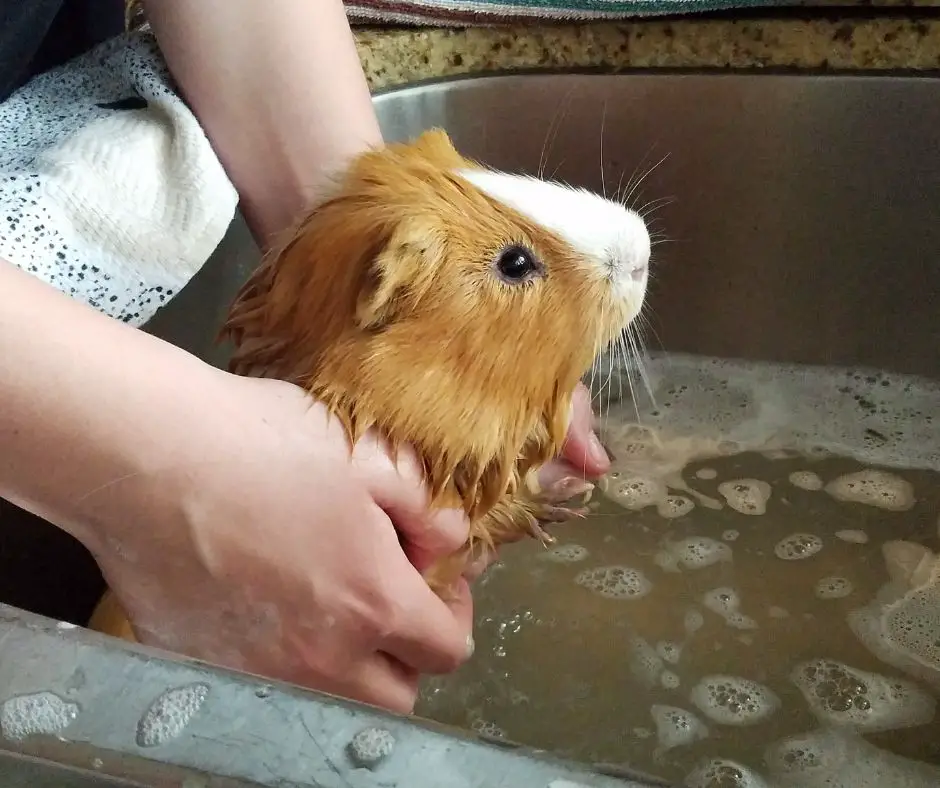
The shampoo is suitable for bathing guinea pigs. But you need to ensure you’re using the right guinea pig shampoo. Some brands cause allergic reactions and skin irritation.
You should not under any circumstance use human hair shampoo to clean your beloved piggy. These rodents have sensitive skin, and chemicals in human shampoo tend to irritate their skin and eyes.
Such shampoo also makes a guinea pig’s skin dry out much, leading to painful itchiness and hot spots. A dry and itchy skin opens the pathway for hair loss as guinea pigs scratch themselves.
Also read: How To Bathe a Guinea Pig?
What Should You Do If Your Guinea Pig Is Losing Hair?
If your beloved cavy is losing hair, you can’t address the issue until you know what is causing it. Guinea pig alopecia/hair loss is a problem that crops up for many different reasons.
It means that if this condition occurs, you can rule out many potential causes before finding the principal cause. Your pig can lose hair on different parts of the body depending on its fundamental cause.
Therefore, you should identify the location where the pig experience hair loss before everything else.
Also, don’t forget that these creatures are hairless behind the ears and between the nose and lips; it’s their nature.
Afterward, seek help from your veterinarian. He/she will diagnose your little friend to investigate the reason for hair loss. Since hair loss in guinea pigs is diversified, their treatment also varies.
Will Guinea Pigs Hair Grow Back?
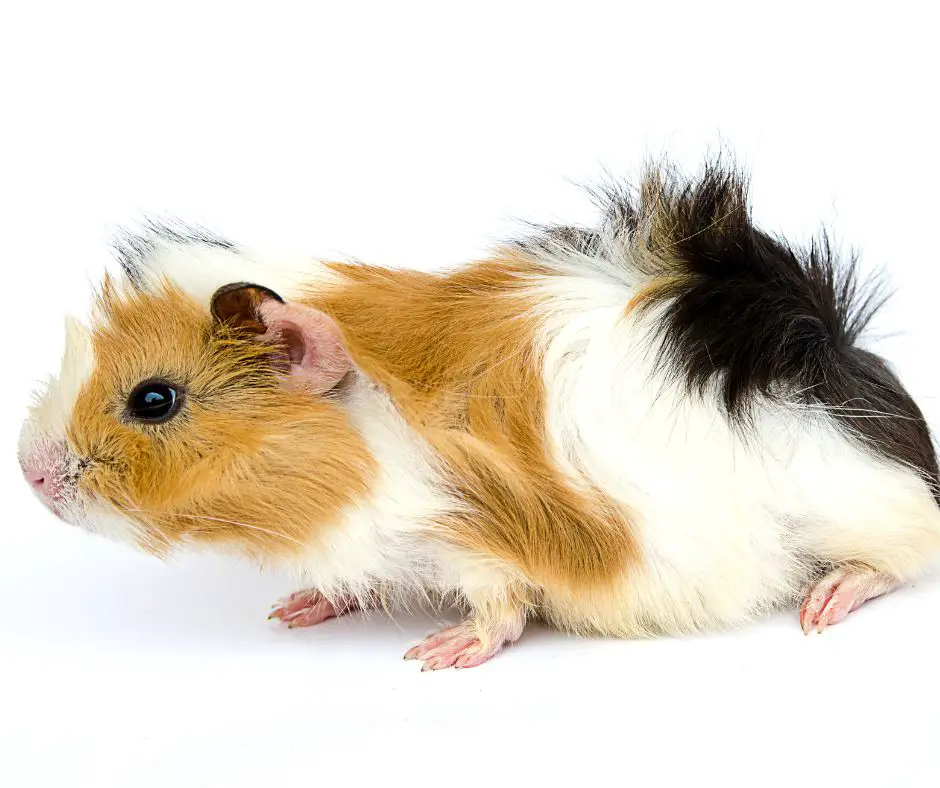
If your pig loses hair, it gives you hope to know that the hair can regrow. Yes, guinea pig fur/hair will grow back if they lose it.
The lost hair typically takes about a month to grow back and fill in fittingly. However, how long your pig will take for the hair to grow back can vary depending on what caused the problem in the first place.
Each circumstance is different since sometimes the pig’s hair will regrow naturally, and in other situations, it requires medication for the hair to grow back.
Don’t worry if your friend lost hair and it doesn’t look appealing. The hair will grow back, and the pig will reattain its beauty.
Most importantly, seek advice from your vet if your pig experiences alopecia; he will recommend what treatment will work best.
Tips to Maintain a Healthy Hair for Guinea Pig
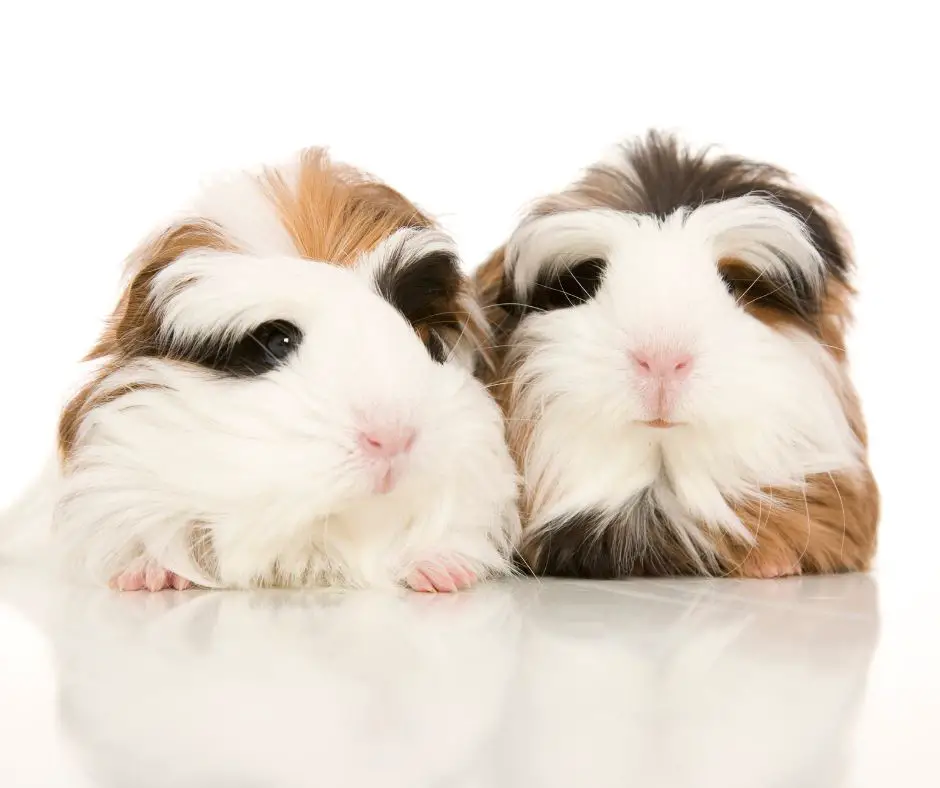
Maintaining hygiene is a crucial factor if you own a guinea pig. Be sure to provide a clean, warm, and dry cage to your cavy companion at all times. Also, Don’t bathe your piggy too regularly, just a few times a year, if needed. Too often will create dry skin.
Dirty and wet litter will typically affect your piggy’s skin. Another imperative thing to consider is your guinea pig’s diet. Giving your sufficient pet nutrients protects it from becoming sick.
Supply vitamin C supplements and fresh fruits and vegetables in the correct proportion to avoid scurvy. Scurvy aggravates hair loss problems in guinea pigs.
Furthermore, guinea pigs need ample space to exercise and express their normal behaviors. Exercising in guinea pigs is profound since it reduces obesity issues and avoids pododermatitis.
Perform a grooming service to your pet more often. Cut the overgrown nails to avoid potential injuries and comfort the animal when moving.
Perform regular check-ups on your little friend, and in case of any problem, always make sure to inform your vet. If you execute all these measures, your guinea pig hair always appears healthy.
J·R·LIGGETT’S Small Animal Liquid Shampoo Great for Sensitive Skin
Conclusion
There are numerous causes for bald patches and hair loss in guinea pigs, including barbering, fungal infection, parasitic infection, allergic to shampoo, etc.
If you suspect something unusual with your little friend, visit your veterinarian immediately.
He will conduct a full examination of your guinea pig to determine the cause of hair loss. Treatment varies depending on the condition that causes hair loss.
The time for a guinea pig to grow back its hair is contingent on the basic cause of the problem. Some pigs recover after some time, but others will go for a long time.
You can maintain healthy fur for your pet by supplying adequate vitamin C, a proper diet, and giving ample space to allow freedom of exercise. A healthy guinea pig is always a happy guinea pig.
